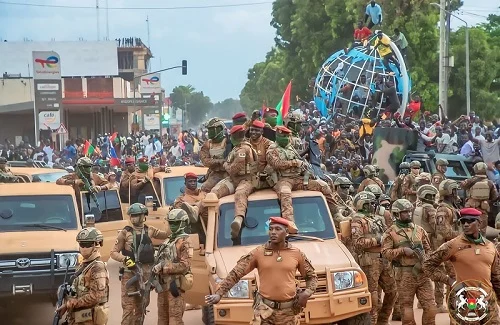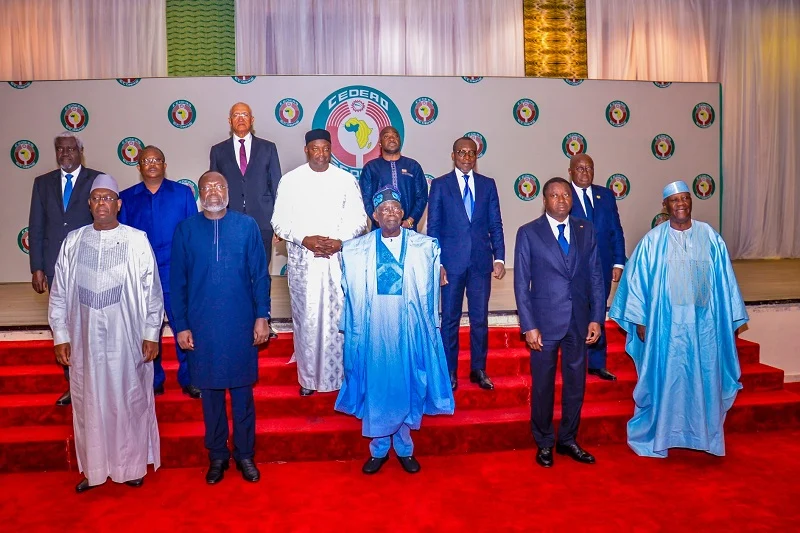

Captain Ibrahim Traore on his return from Russia (Image courtesy: Armed Forces of Burkina Faso)
Defence chiefs of 15 countries in Western Africa are holding an ‘extraordinary meeting’ in Nigeria’s capital of Abuja on Wedensday to discuss the political and security situation in Niger which continues to deteriorate following a military coup that took place on July 26.
The meeting of the Committee of Chiefs of Defence Staff (CCDS) of the Economic Community of West African States (ECOWAS) takes place after the economic bloc’s heads of state and government met in the same city on Sunday and gave a one week deadline to restore constitutional order in Niger.
“In the event the authority’s demands are not met within one week, (the bloc will) take all measures necessary to restore constitutional order in the Republic of Niger. Such measures may include the use of force,” a statement issued after the July 30 meeting warned.


Last week, General Abdourahamane Tchiani, the commander of the country’s presidential guard, ousted Niger President Mohamed Bazoum in a military coup, creating a major unrest in an already troubled and terror-infested Sahel region of the continent.
The ECOWAS region spans an area of 5.2 million square kilometres with Benin, Burkina Faso, Cabo Verde, Cote d’Ivoire, Gambia, Ghana, Guinea, Guinea Bissau, Liberia, Mali, Niger, Nigeria, Sierra Leone, Senegal and Togo being the member countries.
However, Niger’s neighbours Burkina Faso and Mali, both suspended from the regional bloc following similar military takeovers, warned that any military intervention against Niamey would be tantamount to a declaration of war against their countries as well.
After having failed to show any progress towards a constitutional, civilian-led democracy, Guinea – another country in the Sahel region in sub-Saharan Africa that is now the epicentre of terrorism – has also condemned ECOWAS for imposing sanctions against Niger over the coup saying they will only create more suffering in the poverty-hit nation.
Over the last few days, the United States, France, European Union and the United Nations Security Council have expressed their concerns over the negative impact of unconstitutional changes of government in the region and backed the efforts of ECOWAS as well as the African Union (AU).
After commending the “strong leadership” of ECOWAS to defend constitutional order in Niger, the US Secretary of State Antony Blinken dialled Nigerien President Mohamed Bazoum and African Union Commission Chairperson Moussa Faki Mahamat on Tuesday.
“Secretary Blinken and Chairperson Faki reiterated the shared US-AU priorities of seeing the immediate release of President Mohamed Bazoum and urged respect for the rule of law and public safety. The Secretary and Chairperson Faki also welcomed regional leadership and cooperation, which is essential to restore constitutional order in Niger,” said US State Department spokesperson Matthew Miller.
Meanwhile, Burkina Faso’s interim president Ibrahim Traore returned home to a grand welcome after participating in the second Russia–Africa summit at Saint Petersburg and also after holding a meeting with the Russian President Vladimir Putin at the Constantine Palace on July 29 which has received considerable coverage.
Videos of 35-year-old Captain Traore, who seized power in September, being given a hero’s welcome by thousands of his supporters in the country’s capital Ouagadougou have gone viral on social media since Tuesday.
One of the world’s youngest leaders, the military leader has been praised by the locals for taking an anti-West stand, forcing France to withdraw its special forces troops from Burkina Faso, being vocal on banning Uranium exports to Paris and the United States and, at the same time, calling Russia “family for Africa” and an importan ally.
“A slave that does not rebel does not deserve pity. The AU must stop condemning Africans who decide to fight against their own puppet regimes of the West,” Traore said in Saint Petersburg.
Following their meeting, Putin announced that, in order to “pay great attention” to developing relations with Burkina Faso, Moscow has decided to reopen the Russian embassy in the country, which was closed back in 1992.
“In June, the Russian government decided to contribute 10 million US dollars as voluntary assistance to the UN World Food Programme for humanitarian assistance to a number of countries, 2.5 million of which will go to Burkina Faso,” said Putin.
Also Read: France readies evacuation of its citizens, European nationals from uranium-rich Niger
India decisively asserted its military superiority over Pakistan during this month's brief but intense conflict,…
Trade associations and local business groups in Pakistan-occupied Gilgit-Baltistan (PoGB) launched an indefinite protest on…
A human chain and protest march was organized by various organizations in front of the…
The United States on Saturday announced the expansion of its security partnerships with India through…
Highlighting the use of indigenous platforms during Operation Sindoor, Chief of Defence Staff (CDS) General…
Congress MP Shashi Tharoor on Friday (local time) said that Colombia will issue a statement…